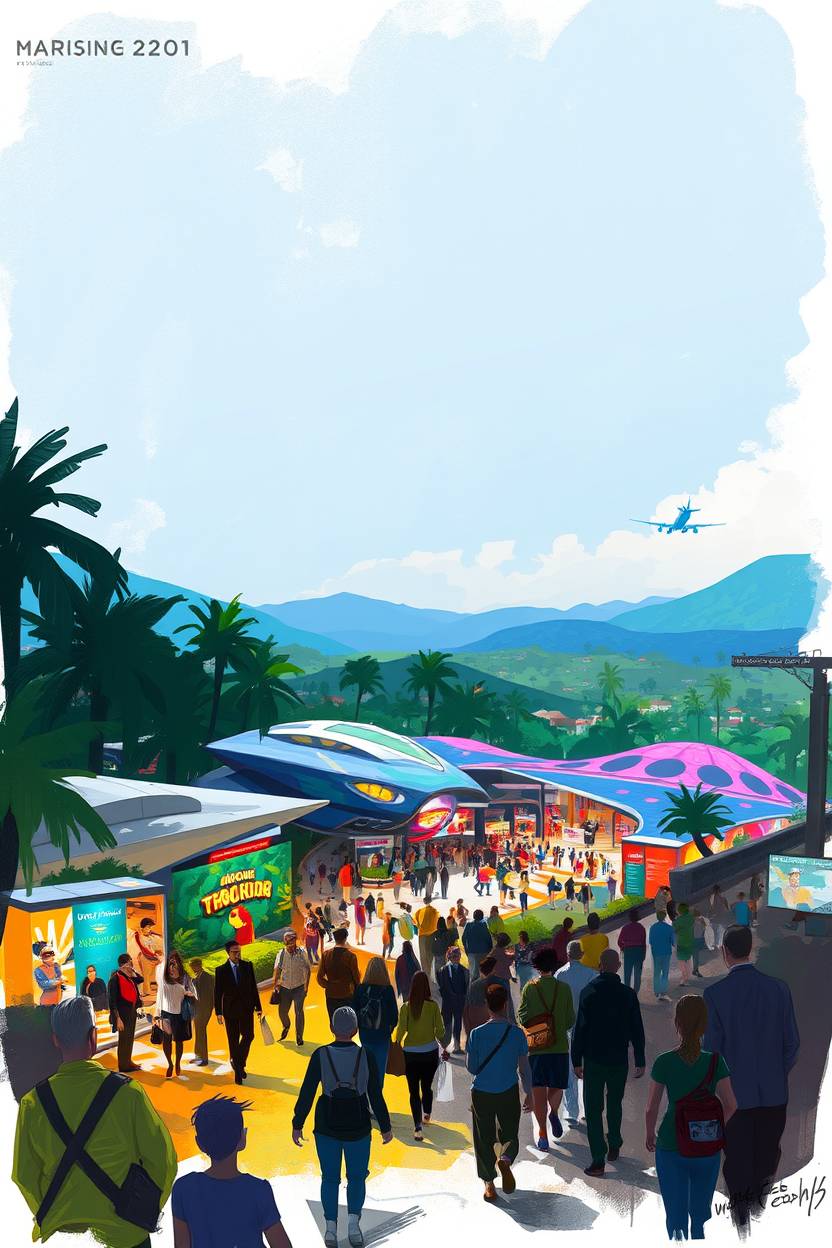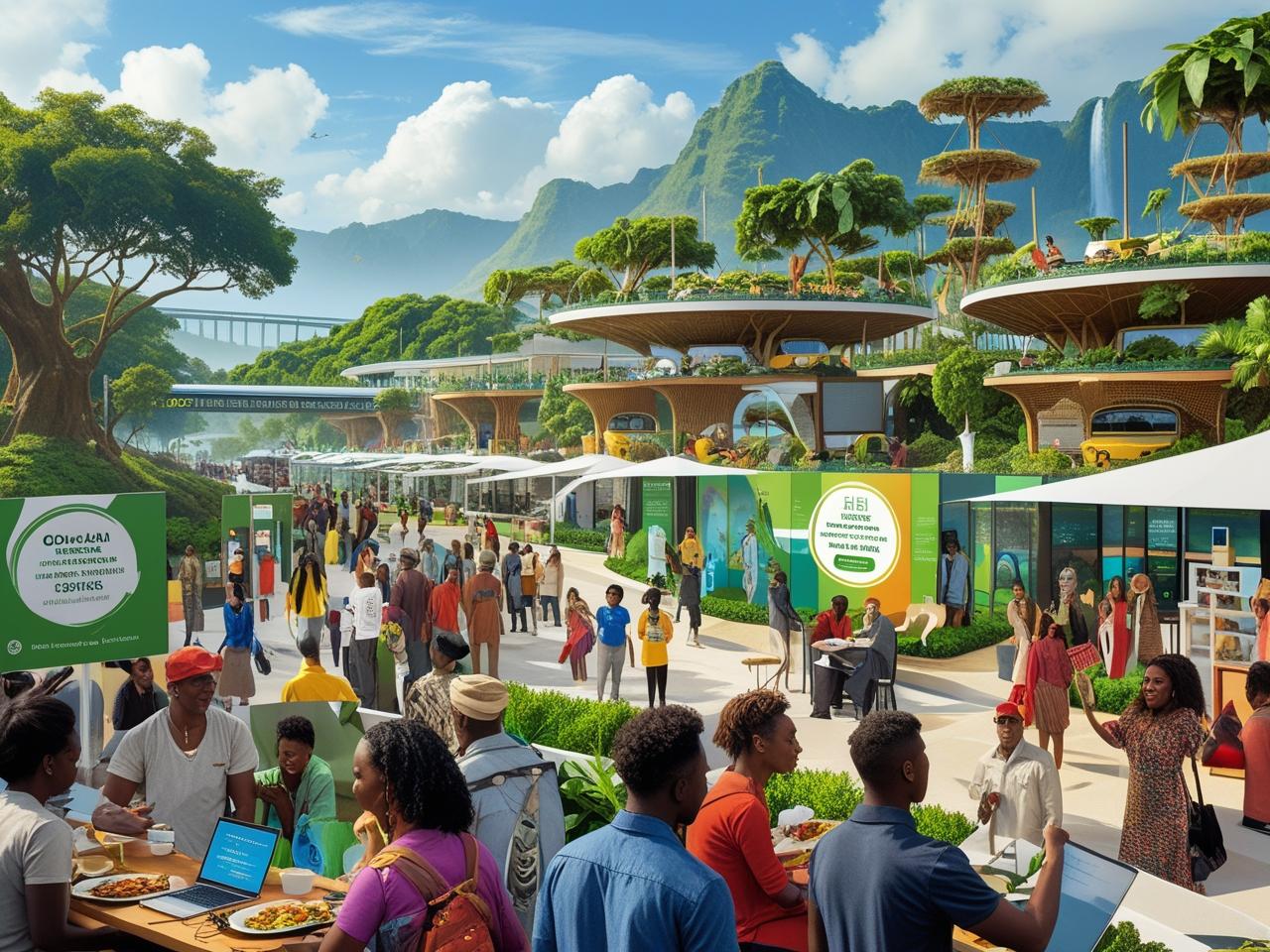
The Week of June 15 – 21 is key for global sustainability. It shows many international events that focus on the environment and working together. These events are linked to the United Nations Sustainable Development Goals (UNSDGs). They help communities around the world talk about our planet’s future.
During this week, groups, governments, and people come together to tackle big environmental issues. These global events offer chances to find new solutions, spread the word, and make real changes in different places.
Every event in this week ties into bigger goals for sustainability. It shows how small actions can make a big difference worldwide. From climate efforts to cultural celebrations, these events show how taking care of the environment and improving human lives are connected.

Understanding Global Observances and Their Impact on Sustainable Development
Global observances are key in raising environmental awareness and promoting sustainable development. These international days connect people, share knowledge, and inspire action to tackle global challenges.
International Days offer chances for Global Participation in various communities. They make complex United Nations Sustainable Development Goals easy to understand and act on.
The Role of International Days in Promoting Sustainability
Environmental awareness grows through global events that focus on key issues. These observances:
- Raise public consciousness about environmental challenges
- Promote collaborative problem-solving
- Encourage grassroots engagement
- Amplify marginalized voices in sustainability discussions
Linking Global Events to UN Sustainable Development Goals
Each international day links to specific United Nations Sustainable Development Goals. These events turn abstract concepts into real actions.
Measuring Impact Through Global Participation
Tracking global participation shows the power of international observances. Community engagement metrics show how individual actions help achieve sustainable development goals.
“Small actions, when multiplied by millions of people, can transform the world” – Environmental Advocacy Network
Environmental Awareness Through Cultural Celebrations

Cultural celebrations are key to spreading environmental awareness worldwide. They turn traditional events into chances for learning about sustainability and working together.
Every culture has its own way of adding environmental messages to their celebrations. This mix of tradition and green thinking encourages people to care more about the planet.
“Culture is the most powerful tool for creating sustainable change in environmental consciousness.” – Environmental Anthropologist Dr. Elena Rodriguez
- Traditional festivals highlighting local ecological practices
- Community-driven sustainability workshops
- Indigenous knowledge sharing about environmental preservation
- Cultural performances emphasizing ecological connections
During June 15-21, global observances show how cultural events boost environmental awareness. Communities share creative ways to blend sustainability into their customs.
| Culture | Environmental Celebration Practice | Sustainability Impact |
|---|---|---|
| Japanese | Tanabata Festival Tree Planting | Annual Reforestation |
| Hawaiian | Ocean Conservation Ceremonies | Marine Ecosystem Protection |
| Indigenous Amazon | Rainforest Preservation Rituals | Biodiversity Conservation |
These celebrations show that caring for the environment knows no borders. By embracing diverse traditions, we can work together towards a greener future.
Week of June 15 – 21 through global observances, UNSDGs, and sustainability
The Week of June 15-21 is key for the environment and global sustainability. It’s a time when many international events focus on the United Nations Sustainable Development Goals. These events inspire people all over the world to work together.
Environmental awareness shines brightly during this week. Many global initiatives link local efforts to big sustainability goals. This shows how important it is for everyone to join forces to tackle big environmental problems.
Key Environmental Dates and Their Significance
- World Wind Day: Promoting renewable energy innovation
- Sustainable Gastronomy Day: Exploring ecological food systems
- Global initiatives focusing on climate action and environmental preservation
Global Participation and Local Action
Communities around the world turn these events into real actions for sustainability. Local environmental programs make global goals real and effective. They make a big difference, touching lives far and wide.
Sustainable Development Goals in Practice
The United Nations Sustainable Development Goals offer a plan to tackle environmental issues. During this week, groups, governments, and people show new ways to achieve these goals.
“Small actions create significant global change when communities unite with shared environmental goals.”
This week is all about raising environmental awareness. It’s a time for people to think about their impact on the planet. It encourages everyone to make choices that help protect our world.
World Refugee Day: Addressing Climate Migration and Social Justice

World Refugee Day shines a light on climate migration. This is where environmental changes meet human rights. As the planet warms, millions must flee their homes. This is due to extreme weather, lack of resources, and environmental damage.
The United Nations Sustainable Development Goals stress the need to tackle climate migration. Communities at risk face new challenges. These go beyond what we usually think of as refugee issues.
- Climate change hits developing areas hard
- Rising seas threaten coastal communities everywhere
- Changes in farming cause economic problems
- Support for displaced people is a matter of social justice
Climate migration is a huge humanitarian issue. We need new, global solutions. Governments, groups, and communities must work together. They must protect human rights and support lasting change.
| Region | Estimated Climate Refugees | Primary Environmental Threat |
|---|---|---|
| Sub-Saharan Africa | 30-50 million | Drought and Desertification |
| South Asia | 40-70 million | Sea Level Rise |
| Pacific Islands | 5-10 million | Coastal Erosion |
Helping displaced communities through education and job skills can turn challenges into chances for growth.

Renewable Energy Initiatives and Global Wind Day Celebrations
Global Wind Day is a key moment for renewable energy awareness. It shows how important wind power is for a sustainable future. This day celebrates how wind energy can change our way of dealing with climate change and protecting the environment.
Wind power is changing the renewable energy scene. It keeps getting better, offering new ways to solve global energy problems. People all over the world are seeing big benefits from wind energy projects.
Wind Power’s Role in Sustainable Development
Renewable energy is changing how we make power. Wind energy is a clean, efficient choice instead of fossil fuels. It has many benefits:
- Zero carbon emissions during use
- Little harm to the environment
- Less need for non-renewable resources
- Potential for big energy production
Innovation and Technology in Renewable Energy
New tech is making wind power better. Engineers are making more efficient turbines for different places. New materials and designs are making wind energy more reliable and effective.
Community Impact and Economic Benefits
Wind energy projects bring big economic gains. Local areas see benefits like:
- Jobs in making and fixing turbines
- More money spent on local projects
- Stable prices for energy
- Less carbon emissions
“Wind power is a key way to a sustainable future and fighting climate change,” says Dr. Elena Rodriguez, a renewable energy expert.
Global Wind Day shows that renewable energy is more than just good for the planet. It’s a way to improve our economy and society too.
International Day for Countering Hate Speech: Building Inclusive Sustainable Communities

The International Day for Countering Hate Speech is a key moment for change worldwide. It shows how important social harmony and sustainable development are together. Inclusive communities are key to solving big global problems.
Hate speech harms social unity and progress. It makes it harder to face big issues like climate change and poverty. It also affects how we manage resources.
- Promotes understanding between diverse groups
- Supports peaceful dialogue and conflict resolution
- Strengthens community resilience
- Advances sustainable development goals
Sustainable development needs everyone’s help. When people feel respected, they join in to make a difference. Inclusivity turns conflict into useful talks.
“Unity is strength… when there is teamwork and collaboration, wonderful things can be achieved.” – Mattie Stepanek
Communities that value diversity and fight hate speech can solve big problems. They build strong networks across all kinds of boundaries. This way, they can find new solutions to environmental and social issues.
People can help fight hate speech by:
- Promoting respectful communication
- Challenging discriminatory language
- Supporting educational initiatives
- Amplifying marginalized voices
The way to sustainable development is through empathy and real connections. Every person is important in building communities that can tackle global issues.
Sustainable Gastronomy Day: Connecting Food Systems with Environmental Conservation
On June 18th, the world celebrates Sustainable Gastronomy Day. It shows how our food choices affect the environment and biodiversity. This day reminds us of the link between food and the planet.
“Every meal is an opportunity to support our planet’s health and protect its delicate ecosystems.” – Environmental Food Experts
Farm-to-Table Initiatives: Transforming Local Food Systems
Farm-to-table movements are changing how we think about food. They connect local farmers with those who eat their produce. This helps reduce carbon emissions and supports local farms.
- Minimize transportation emissions
- Support local agricultural economies
- Promote biodiversity conservation
- Enhance food system transparency
Reducing Food Waste: A Critical Environmental Strategy
Food waste is a big environmental problem. Sustainable eating encourages us to buy less, cook creatively, and eat responsibly. This helps cut down on waste.
Supporting Local Food Systems
Local food systems are key to saving the environment. By choosing local and sustainable food, we help the planet. We also keep our food traditions alive and support local businesses.
Sustainable Gastronomy Day is a chance to talk about the link between food, the environment, and saving biodiversity.
Summer Solstice: Traditional Celebrations and Environmental Awareness

The Summer Solstice is a special time when the sun shines the brightest. It happens on June 20th or 21st. This day is the longest in the Northern Hemisphere, making it perfect for learning about living sustainably.
“Nature’s rhythms teach us profound lessons about environmental harmony and human connection.” – Climate Ecology Research Institute
Indigenous cultures around the world see the Summer Solstice as very important. They have created amazing ways to live in harmony with nature, tied to this special day:
- Ancient farmers planned when to plant and harvest based on the solstice.
- Today, we use the sun’s power to create new energy solutions.
- Old wisdom teaches us how to protect our planet.
Summer Solstice celebrations show us how to care for our planet. People everywhere use this day to:
- Teach about using renewable energy.
- Show how to save our environment.
- Work together on green projects.
| Cultural Region | Traditional Practice | Environmental Impact |
|---|---|---|
| Scandinavian Countries | Midsummer Festivals | Community Sustainability Workshops |
| Native American Nations | Sun Ceremonies | Land Conservation Programs |
| Chinese Culture | Seasonal Harvest Rituals | Agricultural Sustainability Training |
By seeing the Summer Solstice as a chance to learn about the environment, we can make our celebrations better. We can teach others about living sustainably and caring for our planet.

Blue Economy Initiatives in Southern Asia: A Model for Sustainable Development
Southern Asia is leading the way in Blue Economy. It’s turning marine ecosystems into sustainable powerhouses. This approach links economic growth with protecting the environment, making it a model for marine conservation and empowering communities.
Coastal communities in Bangladesh, India, and Sri Lanka are leading the way. They use integrated marine management to balance economic benefits with protecting the environment.
Marine Conservation Efforts
Marine conservation in Southern Asia is all about protecting vital marine habitats and biodiversity. Key efforts include:
- Creating marine protected areas
- Restoring coral reefs
- Setting up sustainable marine tourism
Sustainable Fishing Practices
New fishing methods are changing the maritime economy in the region. Small-scale fishers are using technology to reduce environmental harm while keeping their businesses afloat.
- Using advanced tracking for responsible fishing
- Managing marine reserves through community efforts
- Monitoring catches with technology
Coastal Community Development
The Blue Economy model in Southern Asia focuses on local communities. It combines traditional knowledge with modern sustainable development. This creates strong, resilient economic systems.
Sustainable development is not just about conservation, but about creating meaningful economic opportunities for coastal communities.
The success of these Blue Economy projects shows how to balance economic growth with marine conservation. They offer a blueprint for sustainable development worldwide.
Global Waste Management: Innovative Solutions and Cultural Perspectives

Managing waste globally is a big challenge for our planet. Small Island Development States have special problems with waste. They are finding new ways to use resources and reduce waste.
Across the world, new ideas are changing how we deal with waste. People are learning to reduce waste in their communities. This helps keep our planet’s ecosystems safe.
- Circular economy models reducing waste generation
- Community-driven recycling initiatives
- Technological innovations in waste processing
- Cultural adaptations to sustainable practices
Island nations are leading the way in waste management. Recycling programs and turning waste into energy are examples. These show how local efforts can make a big difference.
“Waste is not a problem, but a resource waiting to be reimagined” – Global Sustainability Expert
For global waste management to work, we need to work together. Communities around the world are finding creative ways to use waste. This helps both the economy and the environment.
| Region | Waste Reduction Strategy | Impact |
|---|---|---|
| Pacific Islands | Community Recycling Networks | 60% Waste Reduction |
| Caribbean States | Circular Economy Programs | 45% Resource Recovery |
We can all help by supporting local waste efforts. Choose products that are good for the planet. Also, push for new waste management policies in your area.
World Day of Music: Harmonizing Cultural Celebration with Environmental Consciousness

Music connects us all, bringing people together and sparking change. The World Day of Music, celebrated on June 21st, is a key moment for both cultural joy and caring for our planet.
Music festivals are great for showing us how to live greener. Musicians and event planners are making shows that are good for the earth. They aim to inspire people everywhere.
Eco-Friendly Music Festivals: A Green Revolution
Today’s music festivals are leading the way in being green. They’re using smart ways to care for our planet:
- They have big recycling programs
- They use clean energy
- They cut down on plastic waste
- They encourage people to travel together
Music as an Environmental Advocacy Tool
Artists are now using their music to talk about the environment. Sustainable music events teach us about big ecological issues. They turn fun into a chance to learn and talk about saving our planet.
Sustainable Event Management Strategies
Organizers are working hard to reduce harm to the environment while keeping events fun. They’re using carbon offsetting, buying local, and making concerts waste-free.
The World Day of Music is more than just a party. It’s a worldwide effort showing how music can lead to caring for our planet. It encourages us all to work together for a greener future.

Conclusion
The week of June 15-21 shows how global events and sustainability are connected. Environmental action is more than just doing something on our own. It’s about working together to change our planet’s future. The United Nations Sustainable Development Goals help us see how our actions can make a big difference.
Global events wake us up to important environmental issues. They make people from all over the world come together. Celebrations of renewable energy and cultural events show how sustainability touches our lives.
Every one of us can help by joining in on sustainability efforts. We can help protect our oceans, reduce our carbon footprint, or push for better environmental policies. Our actions add up and help the planet.
Looking back at these important events, we learn a key lesson. Sustainable change comes from understanding, caring, and working together. We all have the power to make a difference, one choice at a time.

Key Takeaways
- Global events during June 15-21 highlight critical sustainability challenges
- United Nations Sustainable Development Goals drive international collaboration
- Environmental awareness grows through targeted international observances
- Local actions contribute to worldwide sustainability efforts
- Cultural celebrations can promote ecological consciousness

